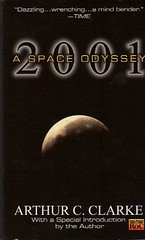 2001: A Space Odyssey - Arthur C. Clarke
2001: A Space Odyssey - Arthur C. ClarkeAt the dawn of mankind, a mysterious monolith appears on a plain somewhere in Africa. It probes the brains of a proto-hominid tribe on the brink of starvation, and subtly changes something in their brains that enables the species to eventually evolve into homo sapiens and dominate the planet.
A few millenia later, the spacecraft Discovery is on its way to study the moons of Jupiter, but its real mission is only known to the onboard computer HAL, and one of the scientists in hibernation.
HAL grows increasingly paranoid because of the secrecy of the mission, and that is just the beginning of problems for Discovery's human crew.
The movie and book were developed at the same time. In my opinion, the book does a much better job of explaining stuff.
Although the film is considered by many one of the greatest (if not the greatest) science fiction pictures, it has been criticized as hard to understand. I would recommend rewatching it after reading the novel.
The late Arthur C. Clarke has been hailed as a visionary, having predicted communications satellites and other technologies that exist today or are very near to doing so.
What struck me most was the environmental collapse he describes in the book (and not mentioned in the movie). Sadly, it seems he wasn't off the mark there either.
A must read for any self respecting science fiction fan.
ISBN-10: 0451457994
ISBN-13: 978-0451457998
No comments:
Post a Comment